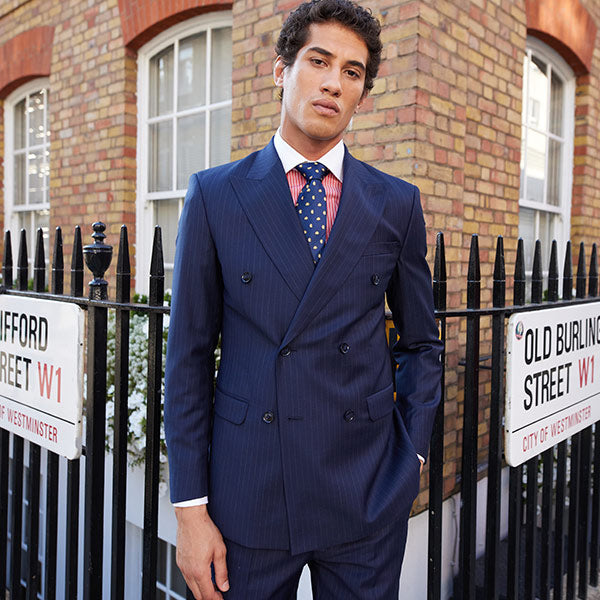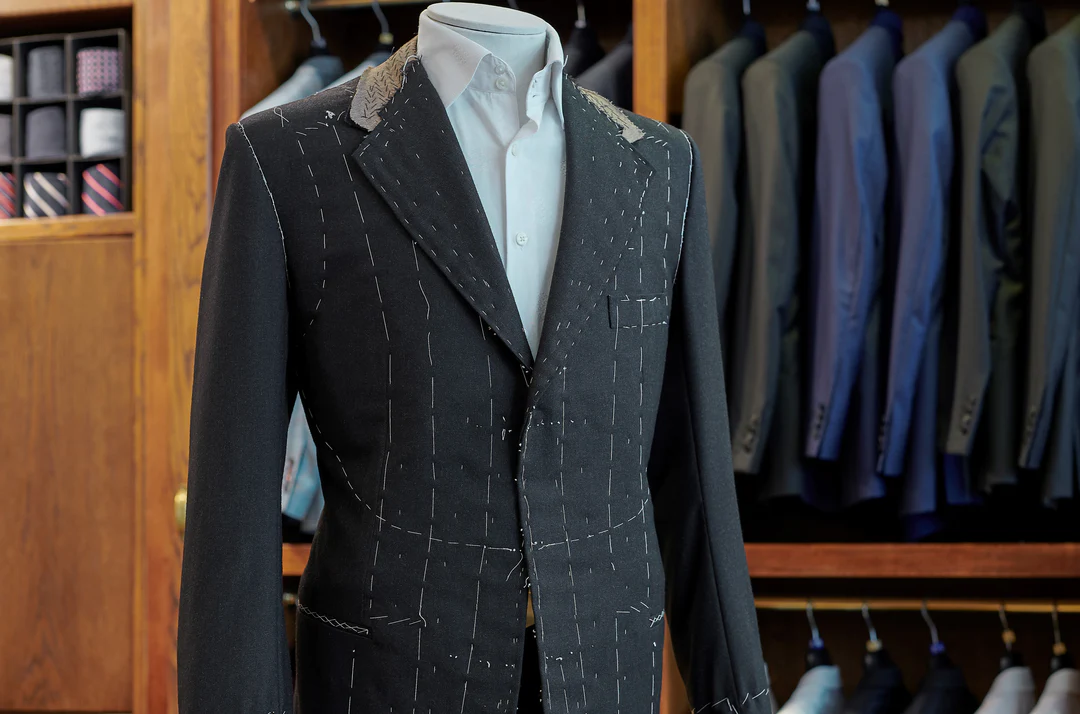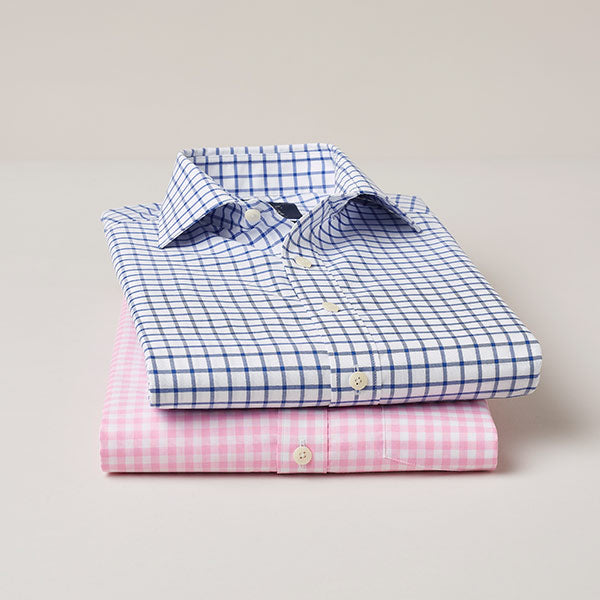If you’re buying business shirts online it pays to know your ‘weaves’. All of The Savile Row Company dress shirts are woven from the finest quality cotton. But it's the way in which that cotton is woven that plays the biggest part in giving each shirt its unique character. For example, a plain white twill shirt looks and feels very different from a plain white poplin shirt that’s cut in the same style. On screen, however, the disparity between the two may be much less apparent. Most men know exactly what they like when they see it. But not everybody knows the technical terms to look for when buying shirts for different seasons, looks and degrees of formality. The most popular shirt weaves for plain color dress shirts are:
 This silky smoothness comes from the way the fine threads are densely woven, evenly crossing under and over each other. Despite being so fine and light, poplin is a highly durable fabric. It’s not the easiest shirt fabric to iron, but when ironed it looks wonderfully sharp and crisp. A poplin shirt is perfect under suit jackets and blazers. Being so fine, it’s extremely breathable but, without a jacket or blazer, white poplin in particular could be a tad too transparent for anyone concerned about parading their chest hair.
This silky smoothness comes from the way the fine threads are densely woven, evenly crossing under and over each other. Despite being so fine and light, poplin is a highly durable fabric. It’s not the easiest shirt fabric to iron, but when ironed it looks wonderfully sharp and crisp. A poplin shirt is perfect under suit jackets and blazers. Being so fine, it’s extremely breathable but, without a jacket or blazer, white poplin in particular could be a tad too transparent for anyone concerned about parading their chest hair.
 As the threads are so fine, the white is only distinguishable when you’re up close. From a distance it creates a gentle ‘heathered‘ effect, softening the tone of the color. So, for example, you’d always describe a blue end-on-end shirt as a ‘blue shirt’, not a ‘blue and white’ one. An end-on-end shirt, like a poplin one, looks fabulously crisp when ironed. It’s smooth to touch, cool to wear – and, given its fine-ness, a great deal more durable than you might expect. Unlike poplin, end-on-end is opaque. So no concerns about transparency here!
As the threads are so fine, the white is only distinguishable when you’re up close. From a distance it creates a gentle ‘heathered‘ effect, softening the tone of the color. So, for example, you’d always describe a blue end-on-end shirt as a ‘blue shirt’, not a ‘blue and white’ one. An end-on-end shirt, like a poplin one, looks fabulously crisp when ironed. It’s smooth to touch, cool to wear – and, given its fine-ness, a great deal more durable than you might expect. Unlike poplin, end-on-end is opaque. So no concerns about transparency here!
 There’s a decidedly luxurious, elegant look to a fine twill shirt with its silky diagonal texture, lustrous sheen and gentle drape. (The ‘drape’ is the way a fabric hangs: so whilst poplin has its sharp, crisp look, twill hangs softly.) The fine-ness of twill derives from the fine-ness of the thread and the tightness of the weave. The fabric itself is more substantial than poplin, and highly durable. Being so soft, a twill shirt is easier to iron and more resistant to wrinkling.
There’s a decidedly luxurious, elegant look to a fine twill shirt with its silky diagonal texture, lustrous sheen and gentle drape. (The ‘drape’ is the way a fabric hangs: so whilst poplin has its sharp, crisp look, twill hangs softly.) The fine-ness of twill derives from the fine-ness of the thread and the tightness of the weave. The fabric itself is more substantial than poplin, and highly durable. Being so soft, a twill shirt is easier to iron and more resistant to wrinkling.
 In shirt terms, however, a herringbone is a variety of twill weave. A fine herringbone has the same properties as a fine twill: luxurious elegance, lustrous sheen, gentle drape, wrinkle-resistance, softness and remarkable durability. But instead of a silky diagonal texture, it has a silky zigzag texture. If you want a ‘dressy’ shirt that will look fabulous worn with or without a jacket, you’ll never go wrong with a fine herringbone.
In shirt terms, however, a herringbone is a variety of twill weave. A fine herringbone has the same properties as a fine twill: luxurious elegance, lustrous sheen, gentle drape, wrinkle-resistance, softness and remarkable durability. But instead of a silky diagonal texture, it has a silky zigzag texture. If you want a ‘dressy’ shirt that will look fabulous worn with or without a jacket, you’ll never go wrong with a fine herringbone.
 Pinpoint is a more substantial weave than poplin, but slightly finer than twill. In technical terms, pinpoint is a variety of ‘basket weave’, which means that equal numbers of ‘weft’ and ‘warp’ threads are crossed under and over each other. This gives the fabric a pleasing texture which has more character than the uniform smoothness of poplin, but is more subtle than twill. And has none of the twills’ lustre. Pinpoint is a soft fabric which breathes well, hangs softly – and marries ‘formal’ with ‘relaxed’ to perfection. Hence its frequent use to cut business shirts with button-down collars.
Pinpoint is a more substantial weave than poplin, but slightly finer than twill. In technical terms, pinpoint is a variety of ‘basket weave’, which means that equal numbers of ‘weft’ and ‘warp’ threads are crossed under and over each other. This gives the fabric a pleasing texture which has more character than the uniform smoothness of poplin, but is more subtle than twill. And has none of the twills’ lustre. Pinpoint is a soft fabric which breathes well, hangs softly – and marries ‘formal’ with ‘relaxed’ to perfection. Hence its frequent use to cut business shirts with button-down collars.
- poplin
- end-on-end
- twill
- herringbone
- pinpoint
Poplin Shirt Weave
What is a poplin shirt? Poplin is the lightest shirt weave. So fine, even and smooth, it’s almost silky to the touch and very cool to wear. This silky smoothness comes from the way the fine threads are densely woven, evenly crossing under and over each other. Despite being so fine and light, poplin is a highly durable fabric. It’s not the easiest shirt fabric to iron, but when ironed it looks wonderfully sharp and crisp. A poplin shirt is perfect under suit jackets and blazers. Being so fine, it’s extremely breathable but, without a jacket or blazer, white poplin in particular could be a tad too transparent for anyone concerned about parading their chest hair.
This silky smoothness comes from the way the fine threads are densely woven, evenly crossing under and over each other. Despite being so fine and light, poplin is a highly durable fabric. It’s not the easiest shirt fabric to iron, but when ironed it looks wonderfully sharp and crisp. A poplin shirt is perfect under suit jackets and blazers. Being so fine, it’s extremely breathable but, without a jacket or blazer, white poplin in particular could be a tad too transparent for anyone concerned about parading their chest hair.
End-on-End Shirt Weave
What is end-on-end cotton? End-on-end is just like poplin, except that it’s woven with one colored thread and one white. As the threads are so fine, the white is only distinguishable when you’re up close. From a distance it creates a gentle ‘heathered‘ effect, softening the tone of the color. So, for example, you’d always describe a blue end-on-end shirt as a ‘blue shirt’, not a ‘blue and white’ one. An end-on-end shirt, like a poplin one, looks fabulously crisp when ironed. It’s smooth to touch, cool to wear – and, given its fine-ness, a great deal more durable than you might expect. Unlike poplin, end-on-end is opaque. So no concerns about transparency here!
As the threads are so fine, the white is only distinguishable when you’re up close. From a distance it creates a gentle ‘heathered‘ effect, softening the tone of the color. So, for example, you’d always describe a blue end-on-end shirt as a ‘blue shirt’, not a ‘blue and white’ one. An end-on-end shirt, like a poplin one, looks fabulously crisp when ironed. It’s smooth to touch, cool to wear – and, given its fine-ness, a great deal more durable than you might expect. Unlike poplin, end-on-end is opaque. So no concerns about transparency here!
Twill Shirt Weave
What is a twill shirt? Twill is a beautiful, interesting and diverse weave: different threads yield dramatically different results. Technically, denim is a twill: take a close look at the inside of a pair of jeans and you’ll spot the characteristic diagonal pattern. And so is herringbone, another very popular shirt fabric (as described below.) There’s a decidedly luxurious, elegant look to a fine twill shirt with its silky diagonal texture, lustrous sheen and gentle drape. (The ‘drape’ is the way a fabric hangs: so whilst poplin has its sharp, crisp look, twill hangs softly.) The fine-ness of twill derives from the fine-ness of the thread and the tightness of the weave. The fabric itself is more substantial than poplin, and highly durable. Being so soft, a twill shirt is easier to iron and more resistant to wrinkling.
There’s a decidedly luxurious, elegant look to a fine twill shirt with its silky diagonal texture, lustrous sheen and gentle drape. (The ‘drape’ is the way a fabric hangs: so whilst poplin has its sharp, crisp look, twill hangs softly.) The fine-ness of twill derives from the fine-ness of the thread and the tightness of the weave. The fabric itself is more substantial than poplin, and highly durable. Being so soft, a twill shirt is easier to iron and more resistant to wrinkling.
Herringbone Shirt Weave
The name herringbone derives from the resemblance between the characteristic chevron pattern of this weave and … herring bones. It’s a traditional pattern that you see in other fabrics besides shirt cotton – particularly wool tweeds. In shirt terms, however, a herringbone is a variety of twill weave. A fine herringbone has the same properties as a fine twill: luxurious elegance, lustrous sheen, gentle drape, wrinkle-resistance, softness and remarkable durability. But instead of a silky diagonal texture, it has a silky zigzag texture. If you want a ‘dressy’ shirt that will look fabulous worn with or without a jacket, you’ll never go wrong with a fine herringbone.
In shirt terms, however, a herringbone is a variety of twill weave. A fine herringbone has the same properties as a fine twill: luxurious elegance, lustrous sheen, gentle drape, wrinkle-resistance, softness and remarkable durability. But instead of a silky diagonal texture, it has a silky zigzag texture. If you want a ‘dressy’ shirt that will look fabulous worn with or without a jacket, you’ll never go wrong with a fine herringbone.
Pinpoint Shirt Weave
If poplin shirts are sharp and twills are luxurious, a pinpoint shirt will look as smart or as casual as you want it to. Pinpoint is a more substantial weave than poplin, but slightly finer than twill. In technical terms, pinpoint is a variety of ‘basket weave’, which means that equal numbers of ‘weft’ and ‘warp’ threads are crossed under and over each other. This gives the fabric a pleasing texture which has more character than the uniform smoothness of poplin, but is more subtle than twill. And has none of the twills’ lustre. Pinpoint is a soft fabric which breathes well, hangs softly – and marries ‘formal’ with ‘relaxed’ to perfection. Hence its frequent use to cut business shirts with button-down collars.
Pinpoint is a more substantial weave than poplin, but slightly finer than twill. In technical terms, pinpoint is a variety of ‘basket weave’, which means that equal numbers of ‘weft’ and ‘warp’ threads are crossed under and over each other. This gives the fabric a pleasing texture which has more character than the uniform smoothness of poplin, but is more subtle than twill. And has none of the twills’ lustre. Pinpoint is a soft fabric which breathes well, hangs softly – and marries ‘formal’ with ‘relaxed’ to perfection. Hence its frequent use to cut business shirts with button-down collars.








